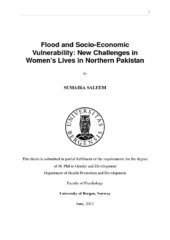Flood and socio-economic vulnerability. New challenges in women's lives in northern Pakistan
Master thesis
Permanent lenke
https://hdl.handle.net/1956/7432Utgivelsesdato
2013-05-31Metadata
Vis full innførselSamlinger
Sammendrag
There is growing concern regarding issues related to Climate change like periodic floods, earthquakes, cyclones, melting glaciers and so on. Pakistan was extremely hard hit by the flash flooding in 2010, which occurred due to increase in rains and melting glaciers that swelled the rivers, lakes, and streams and caused huge destruction across the country. The present study was carried out to investigate social and economic vulnerability resulting from the flood and its impact on women's lives. The study was conducted in the province of Khyber Pakhtunkhwa (KPK), district Nowshera, Pakistan. Qualitative methodologies like group discussions, individual interviews and non-participant observation were applied to investigate the phenomenon. In order to analyze the findings of the study, three interrelated theoretical approaches were incorporated. Community resilience theory is the main theoretical framework. However, vulnerability and social capital theory have also been used to support the analyses from individual level to community level. The analyses shows that people in both the studied ethnic groups, Afghan and Pakhtun, were living comparatively the better lives before the flood occurred. However, the pre- event level of livelihood satisfaction was a bit higher in the Afghan than the Pakhtun group. Moreover, both ethnic groups experienced the exposure to the disaster equally in terms of severity, damage and displacement. The key factor influencing the current bad socio economic conditions is the pre-event poverty entrenched these groups. The level of resistance within both ethnic groups was inadequate to respond to the stressors caused by the flood due to the rapid deterioration of available resources at the time of crisis. Furthermore, the flood had negative effects on women within the households and intensified conflicts within their marital relations because of economic strain and unrest among their spouses as a result of the environmental change. Physical and mental health issues are still persisting two years after the flood, especially among women and children. The feelings towards the future among most of the people interviewed were uncertain and major apprehension was related to the issue of a better future of their children. The role of government, NGOs and INGOs in the re-establishment of the infrastructure and livelihoods of the affected population has not been satisfactory. This generates further vulnerabilities among both ethnic groups. Such vulnerabilities seem to have caused this permanent dysfunction within these communities, and the theoretical analysis indicates a negative outcome of the resilience process.
